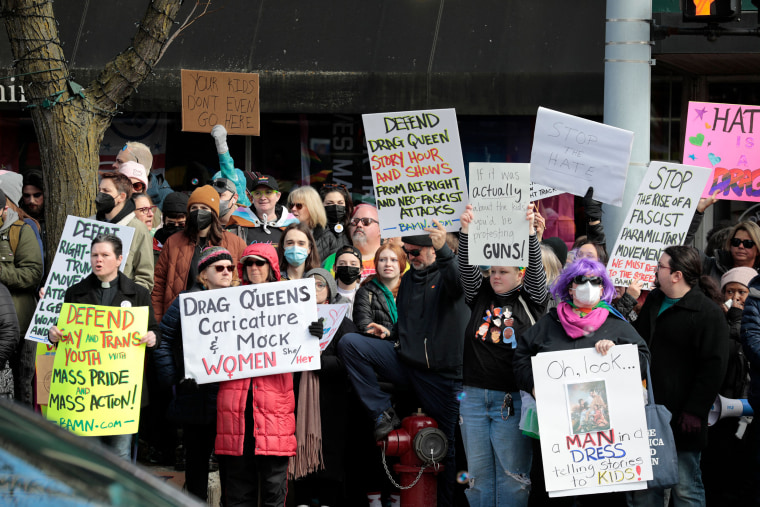Anti-drag mobilization efforts — including protests, threats and violence — are becoming increasingly common in the United States, according to a new report by the Institute for Strategic Dialogue.
The report, released Thursday, recorded more than 200 instances of anti-drag mobilization in the U.S. between June 1, 2022, and May 20, 2023, with more instances in the first five months of 2023 than in the last seven months of 2022. In addition, it found an increasing number of examples where “online hate speech has manifested in offline activity,” such as real-life vandalization using popular online slurs.
The Institute for Strategic Dialogue, founded in 2006, is a nonprofit that funds and conducts research into extremism, polarization and disinformation. Its new “A Year of Hate” report, made up of three parallel reports on the state of anti-drag and anti-LGBTQ sentiments in the U.S. and abroad, is the first series of reports that the organization has put out on anti-drag hate and extremism.
“Last year in June 2022, during Pride Month, we observed a lot of anti-drag and anti-Pride protests,” Clara Martiny, a digital research analyst at the ISD and the lead author of the group’s new report, said. “This year, we decided that ahead of Pride Month 2023, it was really important to understand what’s going on out there in the landscape.”
The art form of drag has existed for centuries, but it has only recently become a focus in the culture war debate. The ISD report said drag events in the U.S. have been targeted by far-right groups since 2017, though this has ramped up over the past several years, according to the ISD and separate, ongoing research by the Crowd Counting Consortium.
Out of 203 incidents reported of anti-drag activity in the U.S. across a period of a year, 49% involved drag queen storytelling events — where drag performers read children’s books at libraries or bookstores and other venues — and 37% involved drag performances, the ISD report. found The states with the most anti-drag activity during this period were New York, Texas, California and Illinois.
In the month directly after the Club Q shooting in Colorado Springs, Colorado, on Nov. 19, the country also saw a sharp uptick in anti-drag protests and threats, according to the ISD. Researchers concluded that the shooting coincided with encouragement from a variety of anti-drag groups that celebrated in the aftermath of the massacre.
In a separate report, also released Thursday, the Anti-Defamation League and the LGBTQ advocacy group GLAAD found that more than 350 anti-LGBTQ hate and extremism incidents occurred in the U.S. over an 11-month period starting June 2022.
In addition to anti-drag protests, threats and violence, there has also been a wave of proposed legislation seeking to restrict where and in front of whom this centuries-old art form can be performed. Over the past year, at least 19 states have proposed such measures, according to an NBC News analysis. The ISD report cited the American Civil Liberties Union, which found 43 proposed anti-drag bills across these states, with five defeated, three passed and 35 still being considered by legislatures.
The report found that the groups behind the anti-drag protests are no longer limited to traditional anti-LGBTQ groups and now include local extremist and white nationalist groups; parents’ rights activists; anti-vaccine organizations; and Christian nationalists. The most active group targeting drag events, according to the ISD, was the far-right Proud Boys organization, which the Southern Poverty Law Center has designated a hate group affiliated with white nationalism.
“Drag is the key frontier on which the so-called culture war is being fought. It’s become this unifying cry for a lot of these groups,” Martiny said. “It creates this ‘The enemy of my enemy is my friends’ situation.”
The ISD also highlighted the Twitter account Libs of TikTok, which has garnered a following of over 2 million as of June, as one of the largest sources of anti-drag sentiments on social media.
The most common talking points by the disparate groups protesting drag and drag performances center around the idea that drag is inappropriate for children due to its supposedly sexual nature. Drag queens and those who support them — such as school officials, librarians and parents — are labeled as “pedophiles” and “groomers” by these groups, according to the report.
The report noted that offline demonstrations against drag events feature tactics to intimidate performers and venues, pressure event organizers to cancel, and rally support for anti-drag sentiments. Many such protests feature threats of physical violence and encouragements to “doxx” performers — a colloquial term that refers to posting the private information of individuals online, often with malicious intent.
Additionally, the report found that anti-LGBTQ sentiments and rhetoric are being exported overseas, particularly to the United Kingdom. While there were fewer anti-drag protests there than in the U.S., the ISD noted that groups in the U.K. have adopted similar talking points to U.S.-based anti-LGBTQ groups.
Martiny said the rise in anti-drag sentiments and mobilization has had a “chilling effect” on three accounts: freedom of speech and expression, safety and well-being of individuals and communities, and legislation that aims to restrict drag and drag performances.
Despite the widespread anti-drag demonstrations, Martiny pointed out that cancellations as a result of anti-drag protests were few in number — organizers canceled only around 6% of drag events in the U.S. as a result of backlash — and that turnout of counterprotesters in support of the LGBTQ and drag communities was often larger than the protests against drag.
“Communities are starting to push back and stand up for their queer siblings,” Martiny said. “While it’s important to be vigilant, it’s important to be aware and have safety measures in place, and it’s important to support your local queer communities, I don’t think that this means we have to stop everything we’re doing.”
